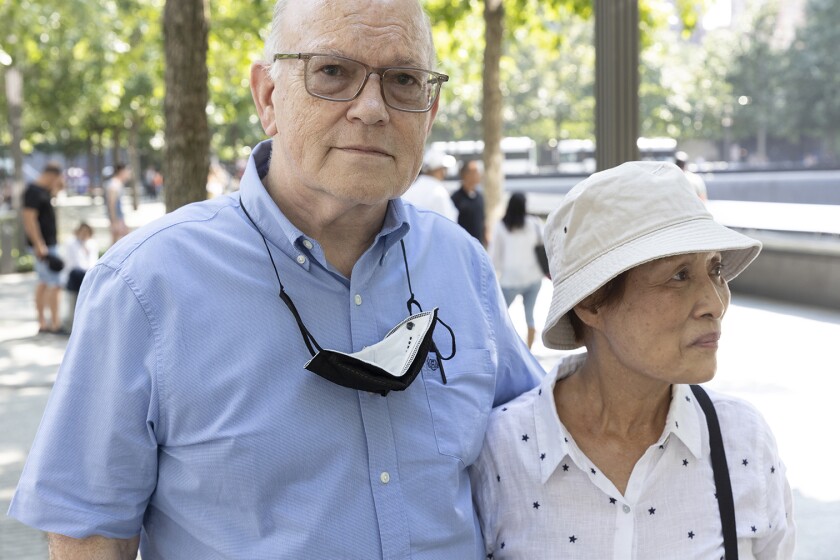
The temperature approached 100 degrees on a recent cloudless afternoon in lower Manhattan. But that didn’t deter a number of locals and tourists from stopping by to pay their respects or satisfy their curiosity. Governing asked visitors for their opinions on the memorial and what it means to them personally, and to the country. Here are some of their stories:

Today Cheryl is a tour guide, leading groups to the 9/11 Memorial. “They are so moved,” she says. “They really are. Just now I had people from Paraguay, from Mexico. Not just Americans are so moved by this.” In her view, much has been lost in the past 20 years. “I just went to the Statue of Liberty with a group of tourists. We had to go through airport-level security to go through the Statue of Liberty. You can’t walk into a large office building in New York anymore. We used to have a much more open society.”
“I was actually in Afghanistan in the early 70s. It was a beautiful and peaceful country, until the Russians got their hands on it and then the United States got their hands on it. We didn’t do them any good at all. We spent billions of dollars. For what?”

Austin was aboard an aircraft carrier when Osama bin Laden was found and killed. “That was a big day for us,” he says. “There was a big celebration. It was good times. We had steak and lobster that night.”
The veteran soldier, wounded in a car accident while on active duty, questions the decision to pull out of Afghanistan. “I was watching the news this morning and I was just mad about it … We were in it and now we’re pulling out. And it’s not working out. I don’t condone it. I think we should have stayed there and helped stabilize their country, if that’s what we needed to do. I don’t know.”

Eric was in middle school when 9/11 happened. “The whole school shut down and some of the parents came and took their kids [home]. I specifically remember where I was when it happened. I think most people do. It was a weird time.”
“It changed everybody’s life,” he says. “Not just firefighters. It hits home because of my profession. But also helps you realize how short life is. One day you walk onto the job and the next day you might not be here.”

“When people started saying this may be a terrorist attack, in my good old southern way I said, ‘They have [messed] with the wrong people.’"
Having lived in Europe during the 1990s, Canter has her own perspective on how American foreign policy is viewed abroad. “I was always blamed that we were too meddlesome. [But] when the matters in Kosovo started happening, they were saying ‘Where is the United States?’ Do you want us to intervene, or do you not want us to intervene?”
“While we don’t want people in Afghanistan to be oppressed by extremists, it also may not be the greatest thing for us to interfere. We cannot fight everyone’s battles for them. We are not the police of the world.”
With her daughter grown, Canter is preparing to re-enter the workforce. “I was thinking about being a 911 dispatcher,” she says. “It would be a nerve-wracking thing, but I’m up for that. I feel like it’s important.”

“We went to help straighten up the finances of American University of Afghanistan,” he says. “Laura Bush pushed to have that school created. The bulk of the support for that school has come from USAID and State Department funds. And it’s been a success in terms of having women graduate. I was there for six months trying to straighten out the financials. It was like a prison camp. But the idea was to keep the bad guys out, rather than the bad guys in.”

Twenty years later, Jennifer is now a ninth-grade civics teacher in Plymouth, Wis. She is visiting the memorial with her husband, three boys and the family dog. “This really is something that we wanted to see and talk to the boys about.”
The stunned silence at school so many years ago has given way to discussion in her own classroom. “We’re not talking to kids about 9/11 in the sense of current events,” she says. “As educators it’s still very raw for us and for the students it’s history. We’re still digesting what it means as people who experienced it firsthand.”

“I just pray for the people that lost someone,” she says. “I’m praying for those that need the strength. I’m praying that they get some kind of peace.”
LaQuantis has a ready answer when asked what lessons there are to be learned here. “How we treat people,” she says. “Because just like that, in seconds, your life is gone. We don’t love enough. We’re not kind enough.”
“This shows that we have support,” she says, gesturing toward the memorial. “This shows that you’re not alone. This shows that we still care about you. We haven’t forgotten about you.”









